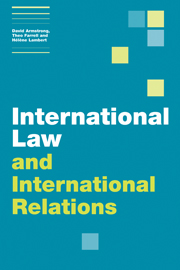5 - Human rights
Published online by Cambridge University Press: 05 June 2012
Summary
International human rights law is mainly treaty law (a characteristic of modern international law) with some human rights principles having passed into customary international law and some having acquired the status of general principles of law. Prior to the development of international human rights treaties, a relatively small number of states provided protection of human rights through their constitutions or specific domestic laws, but even fewer provided an effective legal system of remedies. There has been a parallel growth in domestic provision and international instruments for the promotion and protection of human rights, with important cross-over between the domestic and international. The focus of this chapter is on the international law of human rights. Nonetheless, some consideration is given to domestic law as a source of law in this area and also, crucially, as a source of remedy. Indeed, a principle common to all human rights treaties is that they may only be invoked by individuals when domestic instruments have failed to provide remedy for breaches of human rights.
In the first section we consider the content of international human rights law as rules, liberal or community values, and discourse. The next section explores the reasons for state compliance with human rights law. Here we might note the curious irony of this area of international law, namely, that individual states have nothing to gain by it.
- Type
- Chapter
- Information
- International Law and International Relations , pp. 151 - 177Publisher: Cambridge University PressPrint publication year: 2007
References
- 1
- Cited by



